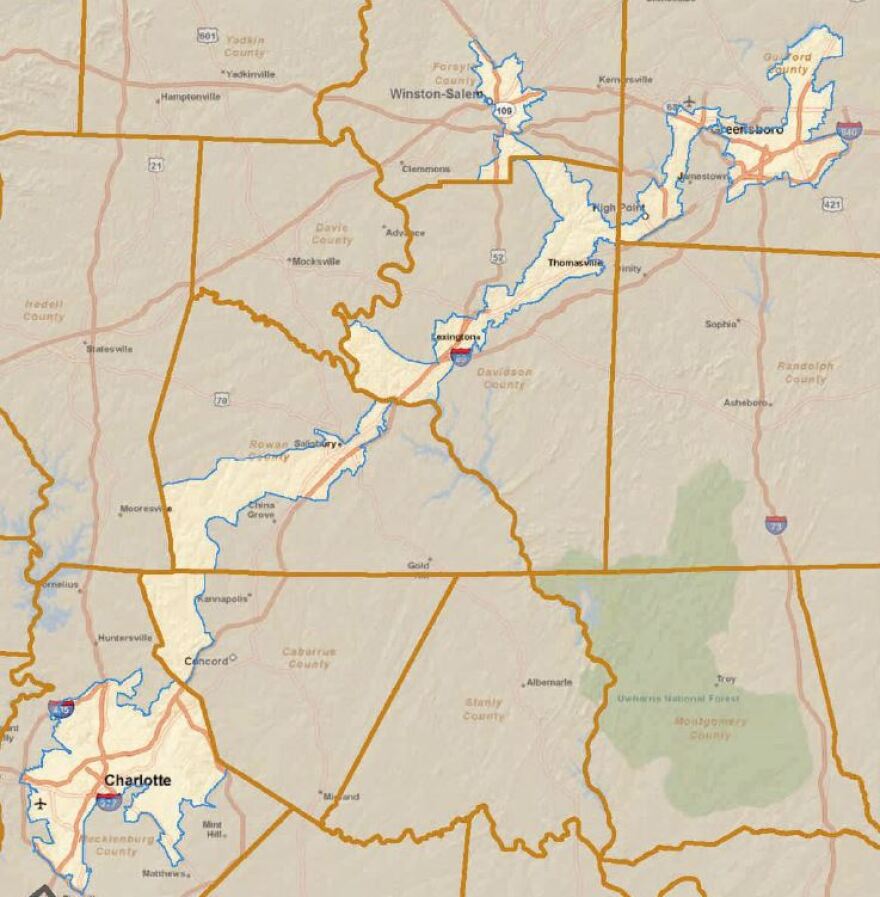At 10:00 a.m. on Thursday, the North Carolina General Assembly will convene a special session. Lawmakers are there to fulfill a federal court order to redraw and ratify the state’s congressional districts by the end of the week.
Redrawing political maps is never pretty. Still, few expected this. "Wow. Ah, this is pretty substantial." That's how Political Scientist Michael Bitzer reacted just after seeing the proposed district maps.
The changes come with challenges for candidates and the election.
Earlier this month, a three judge federal panel found that race was the dominant factor behind the odd shapes of North Carolina’s 1st and 12th Congressional Districts. That is unconstitutional and the judges ordered the districts redrawn. But the octopus like 1st and serpentine shaped 12th touched more than half of the state’s other districts. Instead of nipping here and tucking there a joint committee of state lawmakers, in a party line vote, proposed significant changes to all but one of the state’s 13 districts.

Take the snaking 12th, which weaves from Charlotte to north of Greensboro. It would become short, squat and entirely inside Mecklenburg County. State Representative David Lewis, a Republican, admits it would be a blue district. "I have conceded that Republicans have to work really hard to win this seat."
That is not great news for Republican dominated north Mecklenburg County says Bitzer. "They have been lumped into a heavy Democratic district to where their vote is not going to count for all intents and purposes."
It’s also not great for Democrat incumbent Alma Adams. Her power base is in Greensboro and Winston-Salem. Those areas, like Adams own home, would now be part of the 13th Congressional District. And speaking of the 13th, it would shift about 100 miles west. "For someone like George Holden, who represented the 13th Congressional District that was north of Raleigh," says Bitzer, "Holden now has to come basically to Iredell, Rowan county, Davidson, Davie and parts of Guilford to truly introduce himself to his new constituents."
The same can be said for Republican Representatives Robert Pittenger, and Richard Hudson whose districts would stretch much farther east and include voters who don’t know them.

While the proposed map was being approved by the joint committee on a party line vote, former State Senator Malcolm Graham tweeted this about a redrawn district, “will new 12th mean new opportunities?”
It just may. Which leads us to the challenges this map poses for the election itself. "You are going to have different individuals who may be interested in seeking those seats," says Josh Lawson, the general counsel for the North Carolina State Board of Elections.
This means the state would have to reopen the filing period, when candidates submit the paperwork officially entering the race. It means someone like Malcolm Graham, who lost to Alma Adams in a primary for the current 12th District, could have a better chance in the new 12th.
Normally the filing period lasts three weeks. This one could be much shorter but either way it’s just the start of what Josh Lawson calls a series of cascading logistical effects on the election. Take what’s known as geo-coding voters. "Each individual voter is assigned a district," Lawson explains,"and what has to happen with redistricting and what normally takes a very long time is that each county has to go in and individually assign each voter to the proper district. Now this change is statewide. So this is going to be a massive undertaking."
Then there’s the ballots. Lawson says you can’t just get them printed in a hurry. "These ballots are individually coded. There are roughly 4,500 different types of ballots throughout the state because you may live very close to me but you’re going to get a different ballot because you’re eligible for different contests."
All of this takes time. Plus there’s a federal law which requires absentee ballots be mailed to military service members and overseas voters 45 days ahead of any federal race. Add all of this up and Lawson says North Carolinians may have to wait until June, possibly later before they could vote in a congressional primary.
There’s another problem this poses for the election. The cost. In North Carolina it’s the counties which pick up most of the tab for elections. This would be an extra election, one, says Lawson which many counties simply cannot afford. "We polled the counties and asked them to assume that there was a separate congressional primary. With 100 counties responding 87 indicated that they did not have funds sufficient to cover a separate congressional primary." In Mecklenburg County, that cost would be about $500,000 according to the County Board of Elections Director Michael Dickerson. Mecklenburg is one of the counties, however, which can cover the cost.
All of these changes sound, at best, like a real pain. At worst something more says state Senator Dan Blue, a Democrat. "If you think that the people in this state are mad because of the way you redistricted last time, they’re going to be furious because of the way you’re doing this district. This is an abomination, it is a direct assault on democracy."
There is still a chance the Supreme Court may issue a stay in the case, meaning the election can go on as planned. But, if people do want to blame someone for the potential chaos, Republican strategist Larry Shaheen says you shouldn’t blame Republican lawmakers. "This is a liberal issue," he says, adding the fact the current congressional map was originally approved by the U.S. Justice Department. "This drastic map is the consequence of two liberal judges and one conservative judge who did not want to be the odd man out deciding that they were going to be the arbiters of justice in North Carolina."
Those three judges will also need to approve the new map before the changes are made. Or they can throw the whole thing out and draw a new map themselves.






